Wikipedia:Picture of the day/September 2010
|
Featured picture tools: |
These featured pictures, as scheduled below, appeared as the picture of the day (POTD) on the English Wikipedia's Main Page in September 2010. Individual sections for each day on this page can be linked to with the day number as the anchor name (e.g. [[Wikipedia:Picture of the day/September 2010#1]] for September 1).
You can add an automatically updating POTD template to your user page using {{Pic of the day}} (version with blurb) or {{POTD}} (version without blurb). For instructions on how to make custom POTD layouts, see Wikipedia:Picture of the day.Purge server cache
September 1
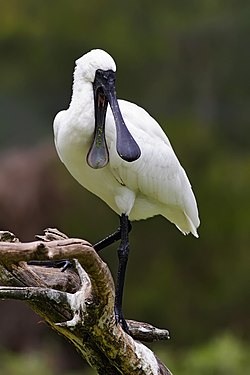
|
The Royal Spoonbill is a species of spoonbill found through much of the Australasia region. It lives in wetlands and feeds on crustaceans, fish, amphibians and small insects by sweeping its spoon-shaped bill from side to side through water. Photo: Fir0002
Recently featured:
|
September 2

|
Plantain Walk by William Berryman, an English artist who was active in Jamaica during the period 1808–16. He produced over three hundred pencil sketches and watercolors of the Jamaican landscape and the daily lives of the island's people, with which he intended to create a series of engravings, but he died before he could begin the project. Much of his unpublished work remained neglected for years, until an album was discovered and acquired by the U.S. Library of Congress. Restoration: Lise Broer
Recently featured:
|
September 3

|
A c. 1805 watercolor painting of Queenstown, Ontario (now spelt Queenston), a village within the town of Niagara-on-the-Lake, located 5 km (3 mi) north of the city of Niagara Falls. Queenston was the site of the Battle of Queenston Heights (the hill on the right), the first major battle of the War of 1812. Artist: Edward Walsh; Restoration: Adam Cuerden
Recently featured:
|
September 4

|
The cryptic mantis (Sibylla pretiosa) is a mantid native to southern Africa. Its common name comes from its ability to grow asymmetrically to match the vegetation of its environment. They have unusual leaf-like projections on the joint of their four walking legs and leaf-like wings, generally the only green portion of the insect's otherwise brown and mottled exoskeleton. Adult females grow to 5–6 cm (2.0–2.4 in) in length while the males are generally about 1 cm smaller. Photo: Luc Viatour
Recently featured:
|
September 5

|
Japanese woodblock political cartoon showing Tsar Nicholas II of Russia waking from a nightmare of the battered and wounded Russian forces, defeated by Japan in the Russo-Japanese War, which concluded with the signing of the Treaty of Portsmouth on September 5, 1905. Shown here are a battleship, locomotive, cannon and telegraph, who, having been fed up with the number of false reports of Russian victories sent home, have returned to show the Tsar the true damage they have suffered. Artist: Kobayashi Kiyochika; Restoration: Jake Wartenberg
Recently featured:
|
September 6

|
A Tanzanian boy transporting fodder on a bicycle. "Fodder" refers particularly to food given to domesticated livestock, rather than that which the animals forage for themselves. Photo: Muhammad Mahdi Karim
Recently featured:
|
September 7

|
The flower of a seaside daisy (Erigeron glaucus), a member of the daisy family native to the Pacific coast of Oregon and California in the United States. This perennial grows from a stout rhizome and reaches heights between 5 and 30 cm (2.0 and 11.8 in). The stems bear up to 15 flower heads which can grow over 3 cm (1.2 in) wide. Photo: Noodle snacks
Recently featured:
|
September 8

|
A house tipped over as a result of the 1900 Galveston hurricane, which made landfall in Galveston, Texas, 110 years ago today. The Category 4 hurricane was responsible for approximately 8,000 deaths, making it the deadliest natural disaster to strike the United States to date (in comparison, 1,800 people died as a result of Hurricane Katrina). After striking Galveston, the storm blew northward to the Great Lakes, then headed eastward just north of Halifax, Nova Scotia, before disappearing into the Atlantic Ocean. Photo: Griffith & Griffith; Restoration: Lise Broer
Recently featured:
|
September 9
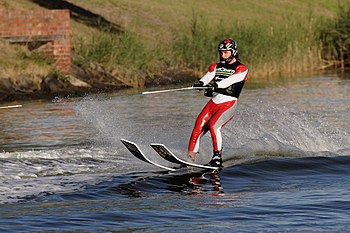
|
A man engaged in waterskiing, a sport in which an individual is pulled behind a boat or a cable ski installation on a body of water, skimming the surface. Waterskiing is a relatively young sport, having been invented in the early 20th century. The skis this person is wearing are specialized for ski jumping. Photo: Fir0002
Recently featured:
|
September 10
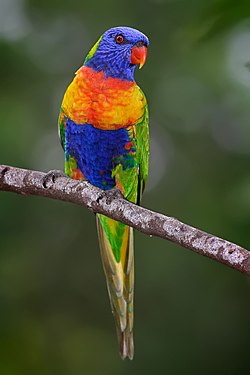
|
The Rainbow Lorikeet (Trichoglossus haematodus ssp. moluccanus shown here) is a species of Australasian parrot. It is a medium sized bird, with the length ranging from 25 to 30 cm (9.8 to 11.8 in) in size, and has a wingspan of about 17 cm (6.7 in). The weight varies from 75 to 157 g (2.6 to 5.5 oz). Its habitat is rainforest, coastal bush and woodland areas, and it feeds mainly on fruit, pollen and nectar. Photo: Fir0002
Recently featured:
|
September 11

|
Damage caused by American Airlines Flight 77 to the Pentagon as a result of the September 11 attacks. The flight was one of four commercial airliners hijacked that day, and the perpetrators crashed it into the building, causing 189 deaths, including all 64 on board the plane. The damaged sections were rebuilt in 2002. Photo: Tech. Sgt. Cedric H. Rudisill, USAF
Recently featured:
|
September 12

|
A disc of copper made by continuous casting, the process whereby molten metal is solidified into a "semifinished" state for subsequent rolling in the finishing mills. Continuous casting replaced the creation of ingots using stationary moulds. The process allows lower-cost production of metal sections with better quality, due to the inherently lower costs of continuous, standardised production of a product, as well as providing increased control over the process through automation. After casting, this disc was then etched to achieve its final state. Photo: Alchemist-hp
Recently featured:
|
September 13
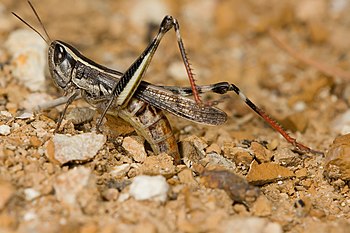
|
A female Common Macrotona (Macrotona australis) laying eggs. This species of grasshopper is found throughout southern and eastern Australia in heath habitats, usually in conjunction with spinifex grass. It ranges from 1.7 to 3 cm (0.7 to 1.2 in) in length and is usually red or grey in colour, with bronze colouring behind the hind legs. Photo: Noodle snacks
Recently featured:
|
September 14
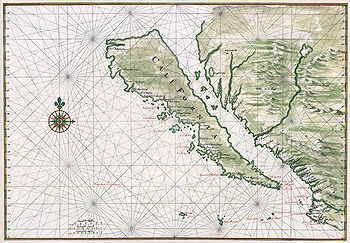
|
A c. 1650 map showing the Island of California, a long-held European misconception, dating from the 16th century, that California was not part of mainland North America but rather a large island separated from the continent by a strait now known instead as the Gulf of California. The belief persisted until the expeditions of Juan Bautista de Anza in 1774–76. Map: Johannes Vingboons; Restoration: Lise Broer
Recently featured:
|
September 15

|
The Royal Australian Air Force (RAAF) Roulettes aerobatics squadron at the 2008 Australian Grand Prix. The squad was formed in 1970 to celebrate the 50th anniversary of the RAAF and perform about 150 flying displays a year throughout Australia and neighboring countries. Photo: Fir0002
Recently featured:
|
September 16

|
The flowers of an Echeveria 'Blue Curl' cultivar. The genus comprises a large number of succulent plants and is named after the Mexican botanical artist Atanasio Echeverría y Godoy. Many of the species produce numerous offsets, and are commonly known as 'Hen and chicks', a term which can also refer to other genera such as Sempervivum. Many Echeveria species are popular as garden plants. Photo: Noodle snacks
Recently featured:
|
September 17
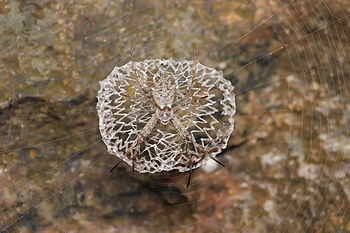
|
An Argiope species of orb-weaver spider sitting on a stabilimentum, the conspicuous silk structure at the center of the web. The purpose of these objects is unknown, although there are a number of theories. It was originally believed to help stabilize the web (hence the term stabilimentum), but this idea is dismissed nowadays. Photo: Muhammad Mahdi Karim
Recently featured:
|
September 18

|
The Illustrated London News's depiction of students preparing to defend the Siege of Paris, the final action in the Franco-Prussian War. The siege began on 18 September 1870, and ended four months later with the defeat of France and the proclamation of William I as emperor of the German Empire. Paris sustained more damage in the siege than in any other conflict. Dissatisfaction with the German government led to rebellion and the formation of the Paris Commune in 1871. Illustrator: Fred Barnard; Restoration: Adam Cuerden
Recently featured:
|
September 19
|
The Nyrstar zinc works at Lutana, Tasmania, is the island's largest exporter, generating 2.5% of the state's GDP. It produces over 250,000 tons of zinc per year. The town, now a suburb of Hobart, was originally built by Electrolytic Zinc as homes for employees of the smelter. Photo: Noodle snacks
Recently featured:
|
September 20

|
A female Hardhead (Aythya australis), the only true diving duck found in Australia, swimming amongst duckweed. Hardheads are relatively small ducks, usually not much more than 45 cm (18 in) long. Both male and female are a fairly uniform dark brown above, with rufous flanks and white undersides. Photo: Fir0002
Recently featured:
|
September 21
|
A panoramic view of Keswick, a market town in Cumbria, the northwesternmost county in England, as seen from Latrigg, a fell north of the town. Derwentwater and adjacent fells can be seen in the background. The area lies within the boundaries of Lake District National Park. Photo: David Iliff
Recently featured:
|
September 22
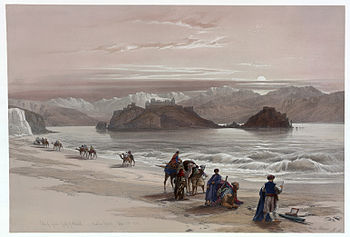
|
An 1839 lithograph showing a caravan passing the Isle of Graia, along the shore of the Gulf of Aqaba, one of two gulfs of the Red Sea, lying east of the Sinai Peninsula. The gulf is named after the city of Aqaba, Jordan's only seaport. It was formerly known as the Gulf of Eilat, after Aqaba's neighboring city Eilat, Israel. Lithograph: Louis Haghe; Artist: David Roberts; Restoration: Lise Broer
Recently featured:
|
September 23
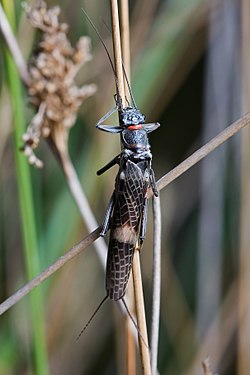
|
A Eusthenia species of stonefly. The order contains almost 3,500 known species, including the only known insects that are exclusively aquatic from birth to death. Stoneflies are believed to be one of the most primitive groups of Neoptera and are found worldwide, with the exception of Antarctica. Photo: Noodle snacks
Recently featured:
|
September 24

|
An early design for The Concourse, a 175 m (574 ft) tall high-rise commercial and residential building on Beach Road in Kallang, Singapore. The project began in 1981 but was halted when Singapore's economy was hit by a recession in the mid-1980s. A new architectural firm took over in 1987 and completed the building in 1994. Image: Paul Rudolph; Restoration: Lise Broer
Recently featured:
|
September 25

|
A flower and buds of a jade plant (Crassula ovata), a succulent plant native to South Africa, but now popular around the world as a houseplant. Jades are evergreen plants, with leaves the color of jade, hence the common name. Under the right conditions, they may produce small white or pink star-like flowers in early spring. Photo: Noodle snacks
Recently featured:
|
September 26

|
The Swaledale breed of domestic sheep (female shown here) is found throughout the mountainous areas of Great Britain. It is noted for its off-white wool and curled horns in males. The pink spot on the ewe's back is the raddling, which indicates that it has already mated. Swaledales are hardy sheep, and are able to be reared without indoor accommodation. They are an official symbol of the Yorkshire Dales. Photo: David Iliff
Recently featured:
|
September 27
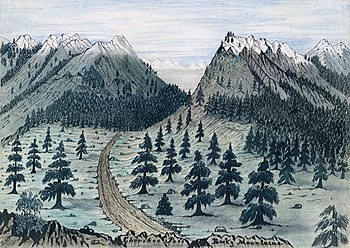
|
A colored sketch of a portion of the Cherokee Trail, a historic overland route starting in what is now the U.S. state of Oklahoma, winding through Kansas and Colorado before joining the Oregon, California and Mormon Trails in Wyoming. It was one of the primary routes used by prospectors in the California Gold Rush. Gold discovered on the route led to the Colorado Gold Rush. Artist: Daniel A. Jenks; Restoration: Lise Broer
Recently featured:
|
September 28

|
A bismuth crystal covered with an iridescent oxide surface. Bismuth is a post-transition metal with the atomic number 83. It is generally considered to be the last naturally occurring stable, non-radioactive element on the periodic table, although it is actually slightly radioactive. Bismuth compounds are used in cosmetics, medicines, and in medical procedures. As the toxicity of lead has become more apparent in recent years, alloy uses for bismuth metal as a replacement for lead have become an increasing part of bismuth's commercial importance. Photo: Alchemist-hp
Recently featured:
|
September 29

|
An engraving by Gustave Doré of a scene from Miguel de Cervantes's Don Quixote, the most influential work of literature from the Spanish Golden Age in the Spanish literary canon. The scene illustrated here occurs early in the novel, when Alonso Quixano (Quixote's real name) has become obsessed with books of chivalry, and believes their every word to be true, despite the fact that many of the events in them are clearly impossible. Don Quixote was published in two separate volumes, ten years apart. It is considered a founding work of modern Western literature, and it regularly appears high on lists of the greatest works of fiction ever published. Restoration: Adam Cuerden
Recently featured:
|
September 30
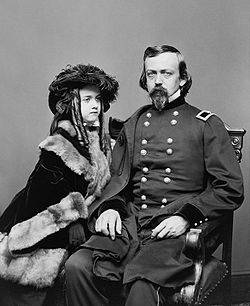
|
Brigadier General Charles Pomeroy Stone (1824–1887) and his daughter Hettie, photographed together in the spring of 1863. Stone was a career United States Army officer, civil engineer, and surveyor. He fought in the Mexican–American War and was reportedly the first to volunteer for the Union Army in the American Civil War. Afterwards, he also served as a general in the Egyptian Army. His non-military accomplishments include serving as chief engineer for the construction of the base of the Statue of Liberty. Photo: Unknown; Restoration: Michel Vuijlsteke
Recently featured:
|
Picture of the day archives and future dates


